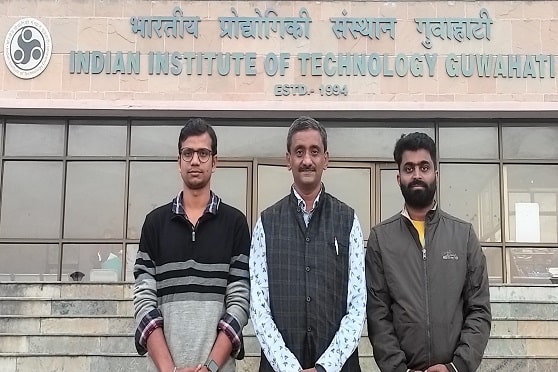IIT Guwahati develops affordable solar cells with high power conversion efficiency


Researchers from the Indian Institute of Technology (IIT), Guwahati, have developed hybrid perovskite-based devices that can generate electricity through solar energy at a power conversion efficiency of more than 21%, the institute said in a statement.
The hybrid perovskite-based devices, also called photovoltaic devices, will produce electricity using sunlight as a source of energy. The high power conversion efficiency was achieved using economical solution-based photovoltaic device processing techniques at mild room temperature.
Scholars Rabindranath Garai (Department of Chemistry), Ritesh Kant Gupta (Centre for Nanotechnology), Arvin Sain Tanwar (Department of Chemistry) and Maimur Hossain (Department of Chemistry) developed these devices under the supervision of Parameswar K. Iyer from the Department of Chemistry and Centre for Nanotechnology and School for Health Science and Technology, IIT Guwahati. The team has achieved remarkable results in terms of efficiency and stability of Perovskite Solar Cells (PSCs).
Among all the renewable energy sources, the energy from the sun is considered to be the most sustainable due to its ample availability on the surface of the earth. Currently, silicon-based inorganic solar cell is a major player in the market. However, this technology requires high-temperature processing that results in the high price of solar panels. Further, the recycling of solar panels is perilous and complicated.
The research of PSCs has received great attention because of the remarkable growth reported in power efficiency. However, perovskite materials are unstable towards humidity and oxygen, which restricts their commercialisation.
“Organic-inorganic hybrid PSCs have experienced rapid growth in terms of efficiency and stability due to the development of highly-efficient functional materials combined with careful device engineering. The materials’ design can be tailored at the molecular level whereas the fabrication process is printable and solution-based, making the overall solar cell development process economical and scalable,” said Parameswar K. Iyer, who supervised the team of researchers.
The research findings have the potential to address the renewable energy challenges regarding the large-scale commercial fabrication of efficient and stable solar panels, added Iyer.
“The results obtained from perovskite solar cells are well beyond the commercial inorganic solar cell panels which are available in the market presently,” he said.